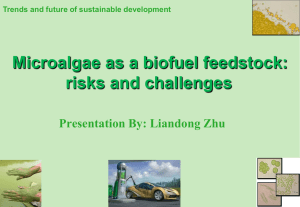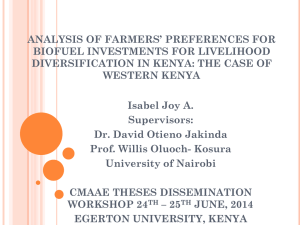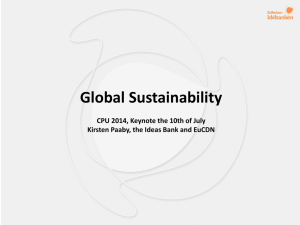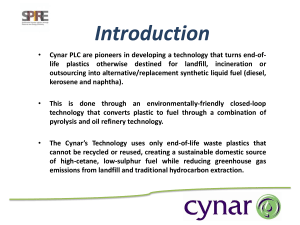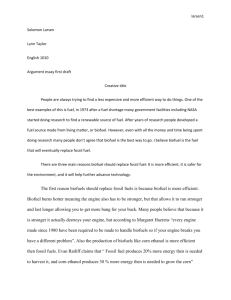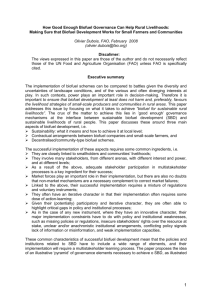June 2014 – Context 1 – Essay – Model Answer
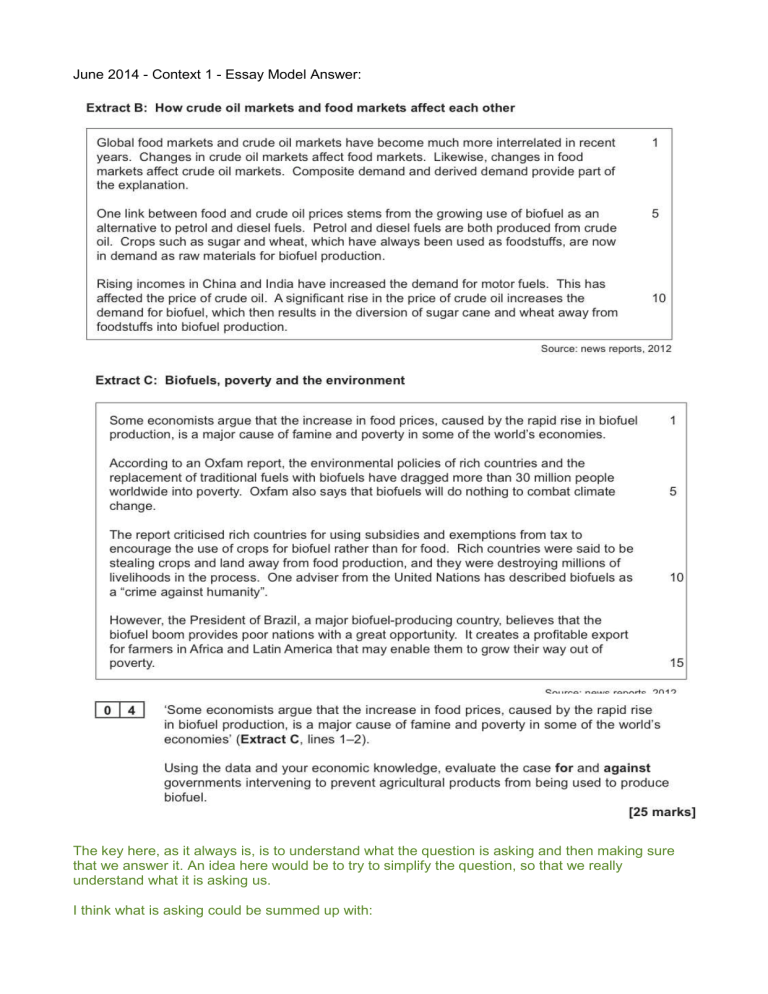
June 2014 - Context 1 - Essay Model Answer:
The key here, as it always is, is to understand what the question is asking and then making sure that we answer it. An idea here would be to try to simplify the question, so that we really understand what it is asking us.
I think what is asking could be summed up with:
Should governments stop food from being used to produce biofuel.
The main starting point has to be the structure of the essay. Here the acronym DIC ED S P A C applies:
Definition
In
Context
Explained
Diagram
Solutions
Problems
Alternatives
Conclusion
The obvious definition from the question is probably Government Intervention.
Government Intervention occurs when a governing body decides to manipulate a market, usually to prevent a market failure. In this case the market failure could be seen to be poverty and inequality as there is evidence in the text that, due to rising food prices, more and more people are unable to afford food, one of the basic needs for survival.
Clearly, as I am referring back to the text, this is in context.
Next up I need an explained diagram. I need this diagram to explain why there is a problem in this market, so I will show that as more crops are being demanded for biofuels, this leaves less available for food.
It is clear that as the amount of fossil fuels reduces, but the world population increases, there is more of a demand for energy sources. This is shown in diagram 1:
Diagram 1:
From this diagram we can see that as the demand for crops such as sugar and wheat (making sure I ’m sticking to this particular question and not going off on a tangent) for biofuel production increases, this causes an extension of supply, pushing the price up to P2. This means there is now further incentive for farmers to produce crops for biofuels, as the price is higher and they can receive more revenue from selling in this market. However, this means there are less crops available for the food market, causing a reduction in supply in that market, as shown in diagram 2:
(Note that I would not normally encourage a candidate to draw more than one diagram for an essay question, but I feel it is necessary here)
Diagram 2:
As we can see from this diagram, the reduction in supply of crops to the food industry has caused the price of food to rise. This has caused, according to the extract (showing the examiner that I ’ve read the extract and am keeping in mind the question) more than 30 million people to be dragged into poverty. This is one of the main reasons as to why governments should intervene to prevent agricultural products from being used to produce biofuel. (Directly quoting the question at the end of the paragraph lets me know that I ’m still on track to answering the question and also lets the examiner know the same.)
Governments sometimes need to intervene in markets to correct market failure, where allocative inefficiency has occurred, where resources have not been allocated in the best possible way to maximise consumer welfare. Clearly, if people are unable to afford their basic needs, a market failure has occurred and this indicates strongly that government intervention needs to be implemented. (If you notice this is actually the ‘Solutions’ part of my DICEDSPAC plan, but I’ve not actually described any solutions, I ’ve just explained the need for intervention. The reason for this is that the question has not asked me to evaluate solutions, it has asked me to evaluate whether or not intervention should occur. This means that I can use different types of intervention as an answer, but I ’m not obliged to. It is more likely that I will do that later on when I’m discussing problems of intervention.)
The reason that the price of wheat and sugar have gone up is due to the rationing, signalling and incentive functions of the price mechanism. As the demand grew, the incentive for farmers was to produce biofuel products, which also rationed the amount of food available for consumers. The only way in which governments could override these functions is either to reduce the supply of foodstuffs to the biofuel market, or to increase the supply to the food markets. (Solutions)
Legislation would probably be the most effective way of reducing the supply to the biofuel market, but there are consequences to this. Those governments who oversee countries where the biofuel technology is being pioneered could see a reduction in employment opportunities in a growing industry, as well as increased costs in policing the new regulations. It is also unlikely that they are the countries that are most affected by the increase in food prices, so there would be little incentive for them to implement this legislation. (Problems)
The governments that are overseeing economies that are developing and are more likely to be reliant on the production of food would also face resistance of such a scheme as their farmers could be prevented from achieving the highest possible price for their goods. As stated in the extract, this gives producers the possibility of growing their way out of poverty. Clearly these are good reasons why the governments should not intervene in the biofuel market. (Problems)
Another way in which governments could intervene may be through subsidies for food producers, which would encourage them to supply more crops for the food industry. However, these are vast markets and the cost to the governments, particularly those in less developed areas, would make this prohibitive. (Problems)
The other significant problem that is faced, is that the markets for these products are global, and, as such, are not controlled by one governing body, so the implementation of any policy would have to be agreed internationally and that would be almost impossible as each individual country is likely to want what is best for their population, rather than the good of humanity, the efficient allocation of resources, so an overriding agreement is unlikely.
This only leaves one viable alternative (Alternative) , to leave the forces of supply and demand to work out the problem for us. There is a problem with the reducing amount of fossil fuels, which will require action and resources will be moved into this area, which will clearly involve an opportunity cost. It may be that individual governments see a need to tackle poverty and inequality as a market failure, but the most efficient way of doing this is unlikely to be from suppressing a growing market that global demand will increase for. Whilst this problem may be enhanced by the transference of food products to the biofuel market, it is very clearly not the only cause, as poverty and inequality have been around for centuries, way before biofuel was considered. Therefore the best approach to solving this particular market failure is likely to come through progressive taxation and the redistribution of income and wealth rather than an overly complicated process of focusing on legislation and subsidies for farmers (Conclusion)
As a result it is clear that governments should not intervene to prevent agricultural products from being used to produce biofuel. (Quoting the question, right at the end, to ensure I
’ve answered it, and that the examiner knows I have too.)
Here ’s the essay without the annotations:
Government Intervention occurs when a governing body decides to manipulate a market, usually to prevent a market failure. In this case the market failure could be seen to be poverty and inequality as there is evidence in the text that, due to rising food prices, more and more people are unable to afford food, one of the basic needs for survival.
It is clear that as the amount of fossil fuels reduces, but the world population increases, there is more of a demand for energy sources. This is shown in diagram 1:
Diagram 1:
From this diagram we can see that as the demand for crops such as sugar and wheat for biofuel production increases, this causes an extension of supply, pushing the price up to P2. This means there is now further incentive for farmers to produce crops for biofuels, as the price is higher and
they can receive more revenue from selling in this market. However, this means there are less crops available for the food market, causing a reduction in supply in that market, as shown in
Diagram 2:
Diagram 2:
As we can see from this diagram, the reduction in supply of crops to the food industry has caused the price of food to rise. This has caused, according to the extract more than 30 million people to be dragged into poverty. This is one of the main reasons as to why governments should intervene to prevent agricultural products from being used to produce biofuel.
Governments sometimes need to intervene in markets to correct market failure, where allocative inefficiency has occurred, where resources have not been allocated in the best possible way to maximise consumer welfare. Clearly, if people are unable to afford their basic needs, a market failure has occurred and this indicates strongly that government intervention needs to be implemented.
The reason that the price of wheat and sugar have gone up is due to the rationing, signalling and incentive functions of the price mechanism. As the demand grew, the incentive for farmers was to produce biofuel products, which also rationed the amount of food available for consumers. The only way in which governments could override these functions is either to reduce the supply of foodstuffs to the biofuel market, or to increase the supply to the food markets.
Legislation would probably be the most effective way of reducing the supply to the biofuel market, but there are consequences to this. Those governments who oversee countries where the biofuel technology is being pioneered could see a reduction in employment opportunities in a growing industry, as well as increased costs in policing the new regulations. It is also unlikely that they are the countries that are most affected by the increase in food prices, so there would be little incentive for them to implement this legislation.
The governments that are overseeing economies that are developing and are more likely to be reliant on the production of food would also face resistance of such a scheme as their farmers could be prevented from achieving the highest possible price for their goods. As stated in the extract, this gives producers the possibility of growing their way out of poverty. Clearly these are good reasons why the governments should not intervene in the biofuel market.
Another way in which governments could intervene may be through subsidies for food producers, which would encourage them to supply more crops for the food industry. However, these are vast markets and the cost to the governments, particularly those in less developed areas, would make this prohibitive.
The other significant problem that is faced, is that the markets for these products are global, and, as such, are not controlled by one governing body, so the implementation of any policy would have to be agreed internationally and that would be almost impossible as each individual country is likely to want what is best for their population, rather than the good of humanity, the efficient allocation of resources, so an overriding agreement is unlikely.
This only leaves one viable alternative, to leave the forces of supply and demand to work out the problem for us. There is a problem with the reducing amount of fossil fuels, which will require action and resources will be moved into this area, which will clearly involve an opportunity cost. It may be that individual governments see a need to tackle poverty and inequality as a market failure, but the most efficient way of doing this is unlikely to be from suppressing a growing market that global demand will increase for. Whilst this problem may be enhanced by the transference of food products to the biofuel market, it is very clearly not the only cause, as poverty and inequality have been around for centuries, way before biofuel was considered. Therefore the best approach to solving this particular market failure is likely to come through progressive taxation and the redistribution of income and wealth rather than an overly complicated process of focussing on legislation and subsidies for farmers.
As a result it is clear that governments should not intervene to prevent agricultural products from being used to produce biofuel.


